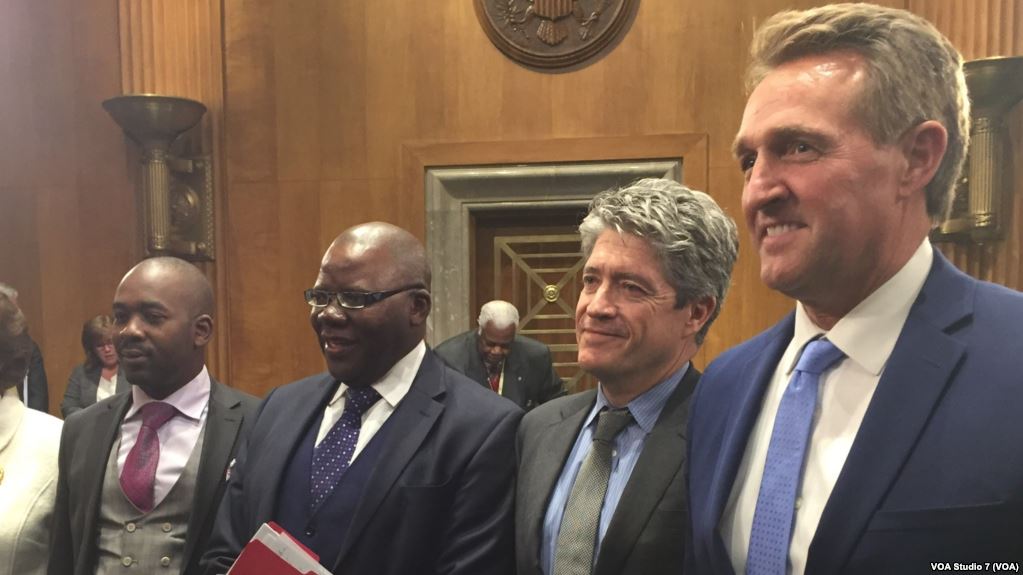by Bevan Musoko
The United States government continues with its covert and overt attempts to undermine Zimbabwe’s economic revival efforts through issuing a travel warning on 22 August 2018 claiming that there is civil unrest in Zimbabwe.
The US State Department claimed that there was violence and political tension in the country following the holding of harmonised elections on 30 July 2018. Where the US got this fabrication is mind boggling given the peace and tranquillity prevailing in the country. It could be the Tendai Bitis and the Nelson Chamisas in Zimbabwe who have vowed to invite sanctions on the country following their defeat in the recent elections. But the US has an Embassy and other liaison channels in Zimbabwe that are available for engagement on this and other matters of mutual interest.
ZANU PF won the majority of Parliamentary seats in the elections, while its Presidential candidate, President Emmerson Mnangagwa, garnered 50.8 percent of the presidential vote. The MDC Alliance losing candidate, Nelson Chamisa is contesting the results of the presidential election, alleging that there was rigging and manipulation of votes.
The MDC Alliance demonstrated in Harare on 1 August 2018 against perceived delays by the Zimbabwe Electoral Commission (ZEC) in announcing the elections’ results, which demonstration later turned violent resulting in the death of six people. Security forces eventually restored order. There is no civil strife, violence and political tension in Zimbabwe as claimed by the Americans. What is obtaining in the country is the normal political discourse that would be found in any country, the US included, where people differ on various issues. This is more so just after the hotly contested harmonised elections. The MDC Alliance leadership has been free to mobilise people towards its cause. This is the hallmark of any democratic dispensation.
What is ironic is that the US travel warning was issued on the day Zimbabwe’s Constitutional Court started hearing Chamisa’s petition against President Mnangagwa’s victory. The hearing of the petition is proof of the country’s functioning democracy, which the US should be supporting, instead of thwarting.
It is the isolated incident of the MDC Alliance violent demonstration which the US is using to demonise Zimbabwe. It is notable that before and since that incident, the country has been enjoying peace and stability. Prior to the elections, the environment in the country was peaceful and all the political parties and candidates freely campaigned throughout the country. Various international groups, among them the African Union, the Southern African Development Community (SADC), the US-based National Democratic Institute (NDI) and the International Republican Institute observed the elections. The NDI and the IRI deployed joint pre-elections and elections observer teams. The election observer team was co-led by former Liberian President and Nobel Peace Prize Laureate, Ellen Johnson Sirleaf and former Interim President of the Central African Republic, Catherine Samba-Panza. The team further comprised U.S. Congresswoman Karen Bass and former U.S. Assistant Secretaries of State for African Affairs, Constance Berry Newman and Ambassador Johnnie Carson.
The joint NDI-IRI observer mission acknowledged that it received unanimous reports that the country’s political climate has changed markedly since last November 2017. It cited the MDC Alliance’s freedom to hold a rally in central Harare on 5 June 2018 as Police denied ZANU-PF a permit to hold a counter rally on the same day. It also noted the general improvement in observance of political freedoms and human rights by the new Government of President Mnangagwa.
It is against this background that the US State Department issued a travel warning against Zimbabwe. Travel warnings are usually taken seriously by various businesspeople and investors, more so given that it is from the US, the superpower wielding unparalleled world influence. The effect on Zimbabwe is that potential visitors for tourism and other business engagements will cancel their travel plans.
The US advised its citizens to stock extra food, water and medication, portraying Zimbabwe as a country experiencing civil strife of such proportions that food, water and medical supplies are in short supply. This is devastating to a country that is working hard to revitalise its tourism industry. Perceptions on security and food availability are key to potential tourists. The net effect of the US action is to destroy all Zimbabwe’s efforts at economic revival.
It becomes inescapable to conclude that the travel warning was issued in pursuit of the economic sanctions represented by the devilish Zimbabwe Democracy and Economic Recovery Act (ZIDERA) whose amendment President Trump recently signed into law. The US should be working towards reciprocating the re-engagement overtures by President Mnangagwa than burning bridges. The US stance may, after all, not be surprising given the various trade wars President Trump has ignited against China, Russia and Canada and other countries. The US is pursuing dangerous unilateralism which is undermining multilateralism espoused by the United Nations.




